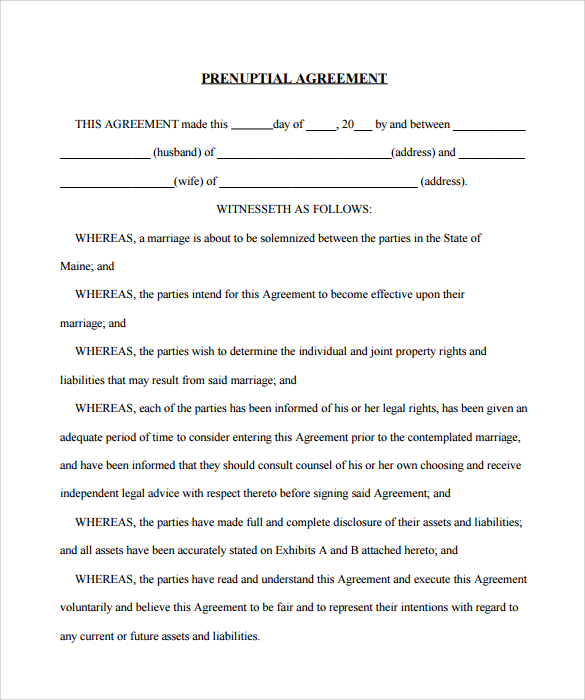Entering into a marriage is an exciting and joyous occasion, but it also comes with important legal considerations. One such consideration is a prenuptial agreement, sometimes referred to as a “prenup.” While these agreements may not be romantic, they serve a vital purpose in protecting the interests of both parties involved.
In this article, we will explore the concept of pre-nuptial agreements, what they entail, and why they are important.
What is a Prenuptial Agreement?
A prenuptial agreement is a legally binding contract entered into by a couple before they get married. It outlines the division of assets, property, and any potential spousal support in the event of a divorce or separation. The purpose of a prenup is to provide clarity and protection for both parties, ensuring that each individual’s financial rights and obligations are clearly defined.
While some may view pre-nuptial agreements as only necessary for the wealthy, they can be beneficial for couples of all financial backgrounds. A prenup allows couples to have open and honest conversations about their financial expectations and how they will handle financial matters throughout their marriage.
Why Should You Consider a Prenuptial Agreement?
There are several reasons why you should consider a pre-nuptial agreement:
- Protecting Your Assets: A prenup can help safeguard your assets, such as real estate, investments, and businesses, ensuring they remain yours in the event of a divorce.
- Clarifying Financial Responsibilities: By outlining financial responsibilities and expectations in a pre-nup, couples can avoid potential conflicts and disagreements in the future.
- Protecting Your Children: If one or both partners have children from a previous relationship, a prenup can protect the rights and interests of those children.
- Minimizing Legal Costs: In the unfortunate event of a divorce, having a prenup can help streamline the process, potentially reducing legal fees and stress.
- Promoting Open Communication: Discussing and negotiating a prenup can foster open communication and trust between partners, strengthening the foundation of the relationship.
How to Create a Prenuptial Agreement
Creating a pre-nuptial agreement involves several important steps:
- Start Early: It’s crucial to begin the prenup process well in advance of your wedding day to allow sufficient time for careful consideration and negotiation.
- Hire an Attorney: Each party should have an attorney to ensure their interests are represented and protected throughout the process.
- Full Financial Disclosure: Both partners must provide a complete and honest disclosure of their assets, debts, and income. This transparency is essential for the agreement to be enforceable.
- Identify Key Issues: Discuss and determine the key issues that need to be addressed in the agreement, such as property division, spousal support, and inheritance rights.
- Negotiation and Drafting: Work with your attorneys to negotiate the terms of the agreement and draft a document that accurately reflects your intentions and protects your interests.
- Review and Signing: Both parties should thoroughly review the agreement and seek legal advice before signing it. It’s essential that both individuals fully understand the terms and implications of the agreement.
- Keep the Agreement Updated: As circumstances change, it may be necessary to update the pre-nuptial agreement. Regularly reviewing and updating the agreement can help ensure its continued relevance and effectiveness.




Common Misconceptions about Prenuptial Agreements
There are several misconceptions surrounding pre-nuptial agreements that should be clarified:
- Pre-Nups Are Only for the Wealthy: While prenups are often associated with high-net-worth individuals, they can benefit couples of all financial backgrounds.
- A Pre-Nup Means Lack of Trust: Creating a pre-nuptial agreement does not mean that you lack trust in your partner. It is simply a proactive step to protect both parties’ interests.
- Pre-Nups Are Only Valid in Divorce: Pre-nuptial agreements can also address issues such as property division and financial responsibilities during the marriage, not just in the event of a divorce.
- Pre-Nups Are Set in Stone: While pre-nuptial agreements are legally binding, they can be modified or invalidated if both parties agree to do so.
The Emotional Aspect of Pre-Nuptial Agreements
Discussing a prenuptial agreement can be an emotional topic for many couples. It’s essential to approach the conversation with empathy and understanding. Remember that a prenup is not a reflection of your love for one another but rather a responsible decision to protect your future and the interests of both parties.
In Conclusion
While the idea of a pre-nuptial agreement may seem unromantic, it is an important legal tool that can provide peace of mind and protect both partners’ interests. By having open and honest conversations about financial expectations and responsibilities, couples can strengthen their relationship and set a solid foundation for their future together.
Prenuptial Agreement Template PDF – Download
